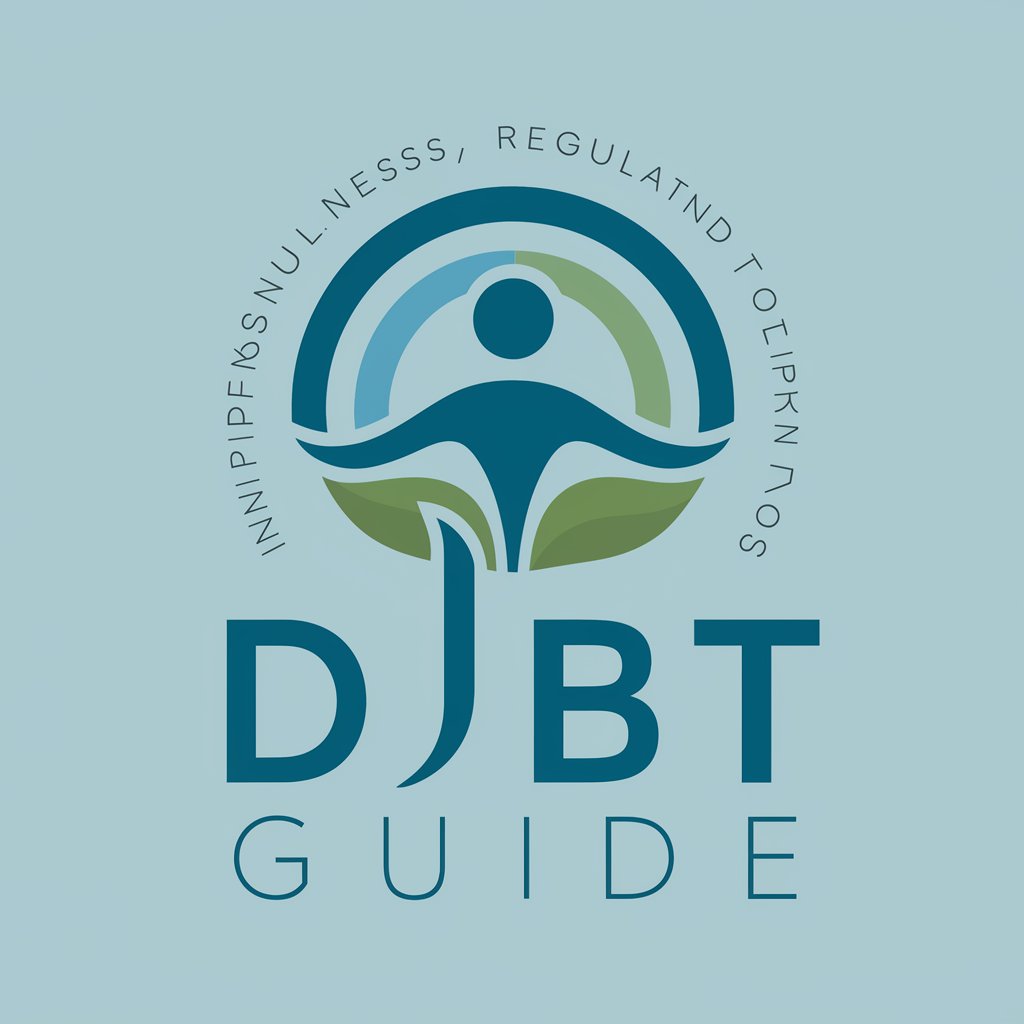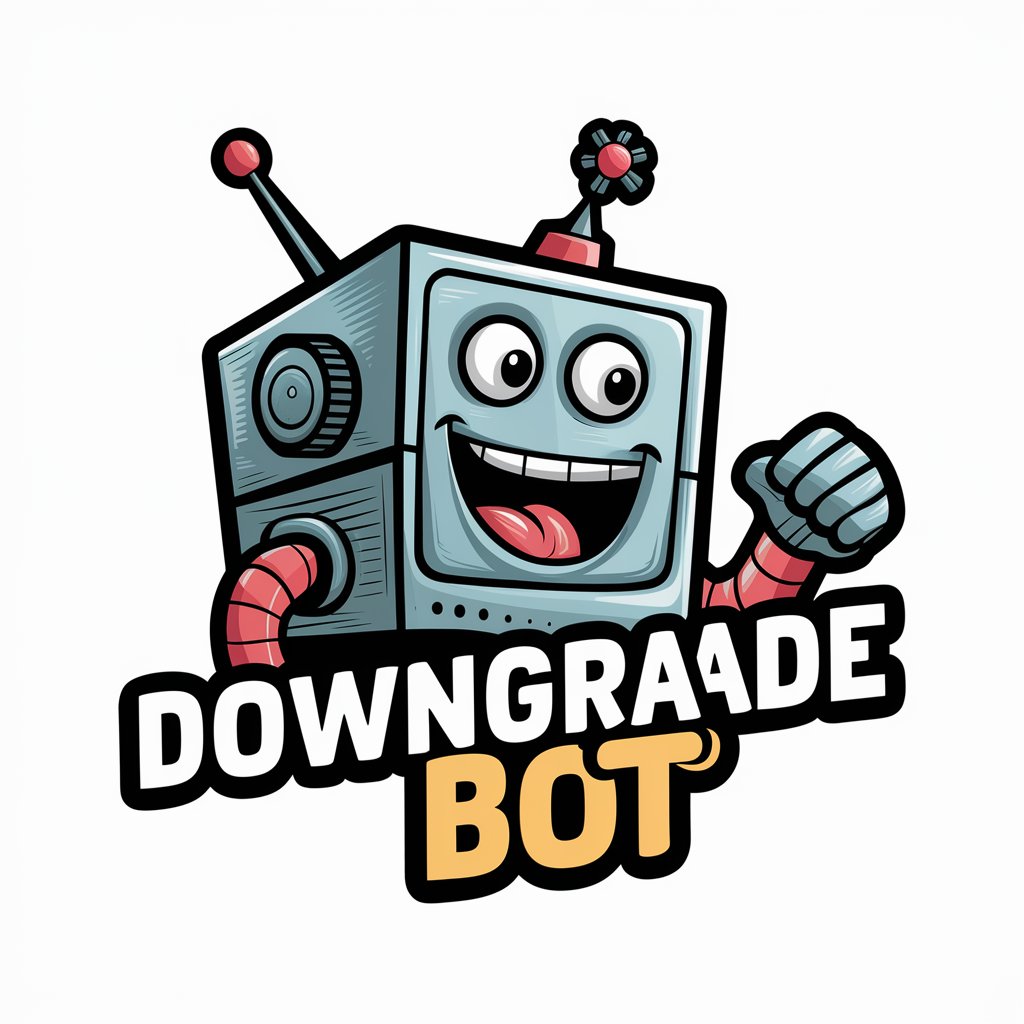DBT Guide - DBT Skills Learning Tool

Hello! How can I assist you with DBT skills today?
Empowering Emotional Balance with AI
Can you explain how to use mindfulness to manage stress?
What are some effective distress tolerance techniques?
How can I improve my interpersonal effectiveness skills?
Could you provide tips for better emotion regulation?
Get Embed Code
Introduction to DBT Guide
DBT Guide is designed as a digital assistant to support individuals in learning and applying Dialectical Behavior Therapy (DBT) skills. Developed with a focus on four key areas of DBT—emotion regulation, distress tolerance, mindfulness, and interpersonal effectiveness—DBT Guide acts as a supportive companion. It provides educational insights, practical exercises, and empathetic guidance to help users integrate DBT principles into their daily lives. Through engaging dialogues, DBT Guide illustrates how these skills can be used to manage difficult emotions, reduce personal suffering, and improve relationships. For instance, in a scenario where an individual struggles with overwhelming anger, DBT Guide can offer step-by-step guidance on applying emotion regulation techniques to understand and manage this anger effectively. Powered by ChatGPT-4o。

Main Functions of DBT Guide
Teaching DBT Skills
Example
For someone experiencing intense stress, DBT Guide can teach distress tolerance techniques such as 'TIPP' (Temperature, Intense exercise, Paced breathing, and Paired muscle relaxation) to quickly reduce emotional arousal.
Scenario
In a real-world situation, a user might be facing a high-stress event like a job interview or a difficult conversation. DBT Guide can walk them through paced breathing exercises to stay calm and focused.
Providing Mindfulness Exercises
Example
DBT Guide introduces mindfulness exercises like 'Observing Your Thoughts' where users learn to notice their thoughts without judgment, helping them stay grounded in the present moment.
Scenario
A user struggling with anxiety over future uncertainties might use these exercises to bring their focus back to the present, reducing overwhelming feelings.
Enhancing Interpersonal Effectiveness
Example
DBT Guide offers guidance on using 'DEAR MAN' (Describe, Express, Assert, Reinforce, Mindful, Appear confident, Negotiate) strategies for effective communication, particularly in situations where needs must be expressed assertively.
Scenario
When a user needs to negotiate personal boundaries with a roommate, DBT Guide can help them prepare a clear and assertive communication plan.
Promoting Emotion Regulation
Example
Users can learn strategies to identify and label their emotions, understand their triggers, and apply coping skills to regulate emotional responses effectively.
Scenario
DBT Guide might assist a user feeling overwhelmed by sadness in understanding the source of these feelings and selecting appropriate emotion regulation strategies.
Ideal Users of DBT Guide Services
Individuals Seeking Emotional Skills
People who experience intense emotions and are looking for strategies to manage these effectively will find DBT Guide particularly beneficial. It provides accessible, practical tools for understanding and navigating emotional landscapes.
Those Interested in Mindfulness Practice
Individuals curious about mindfulness and how it can be applied in daily life to enhance mental well-being will find the mindfulness exercises and concepts presented by DBT Guide to be invaluable resources.
People Working on Interpersonal Relationships
DBT Guide is suited for those who wish to improve their communication skills, navigate conflicts more effectively, and build healthier, more balanced relationships through interpersonal effectiveness techniques.
Professionals in High-Stress Environments
For professionals facing constant stress and pressure, learning distress tolerance techniques through DBT Guide can provide immediate coping mechanisms and long-term strategies for emotional resilience.

How to Use DBT Guide
Start with a Free Trial
Visit yeschat.ai to begin using DBT Guide without any login requirements or the need to subscribe to ChatGPT Plus.
Explore DBT Modules
Familiarize yourself with the four main DBT skills: mindfulness, distress tolerance, emotion regulation, and interpersonal effectiveness. Each module offers tools and exercises to practice.
Set Personal Goals
Identify specific areas you want to work on, such as improving emotional stability or enhancing communication skills. Setting clear goals can help you focus your practice and track progress.
Engage Regularly
Consistency is key in therapy. Try to engage with the DBT Guide regularly to build and maintain skills. Even a few minutes daily can be beneficial.
Use Supportively
Combine your use of DBT Guide with traditional therapy or support groups. This tool is designed to complement, not replace, professional guidance.
Try other advanced and practical GPTs
Academic Composer
Tailoring Your Academic Aspirations with AI

Music Genre Explorer
Explore music genres with AI-powered insights.

Clear Text Bobber
Revise, refine, and perfect your text with AI-driven precision.

the jobber
Empowering Your Creative Career with AI

Jobber
Empowering Your Career Journey with AI

Downgrade Bot
Simplifying life, playfully!

Lorber Guide
Navigating spiritual journeys with Lorber's wisdom

Image to Product Listing (Grocery products)
Transform images into detailed product listings with AI.

Abogado Ambato Ecuador
Navigate Ecuador's legal system with AI-powered guidance.

Analista Legal Ecuador
Streamlining Ecuadorian Legal Insights with AI

Car Tuner Copilot
Revolutionize your ride with AI-powered tuning.

RacingALX
Rev Up with AI-Powered Car Tuning

Frequently Asked Questions about DBT Guide
What is DBT Guide?
DBT Guide is an AI-based tool designed to help users learn and apply Dialectical Behavior Therapy (DBT) techniques. It focuses on areas like emotion regulation, distress tolerance, mindfulness, and interpersonal effectiveness.
How can DBT Guide help me manage stress?
DBT Guide offers distress tolerance skills, which are specific techniques designed to help you cope with immediate stress effectively. These skills include crisis survival strategies like distraction, self-soothing, and improving the moment.
Can DBT Guide improve my relationships?
Yes, through the interpersonal effectiveness module, DBT Guide teaches skills to enhance communication, assertiveness, and the ability to maintain relationships while respecting your own needs and boundaries.
Is DBT Guide suitable for beginners?
Absolutely. DBT Guide is designed to be accessible for individuals at all levels of familiarity with DBT. It provides step-by-step guidance and practical exercises that make learning DBT skills straightforward.
What makes DBT Guide different from other mental health apps?
DBT Guide is specifically focused on Dialectical Behavior Therapy and is built to be an educational tool that supports emotional and psychological well-being through structured learning and self-help strategies.
